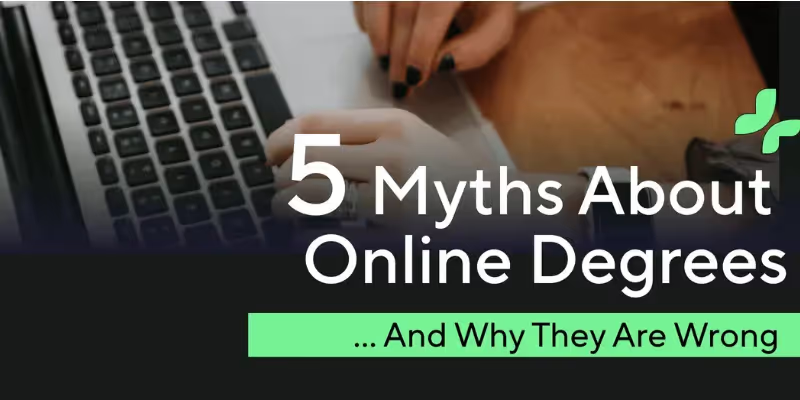Common Online Education Misconceptions
Think online education means lower quality or less engagement? Think again. This article clears up the biggest misconceptions about remote learning—and shows how it can be just as rigorous, social, and effective as on-site studies. How to Find Your Purpose and Make It Count

What comes to your mind when thinking about online degrees?
Perhaps a mix of thoughts, especially if you're from my generation, having pursued education long before online learning became a norm. But let's face it: times have changed. Generations have evolved, technology has advanced, and our sense of belonging has expanded from local to global. In today's world, where we can order anything from anywhere and connect with anyone at any time, learning knows no boundaries.
Online education has emerged as the gateway to a diverse pool of knowledge, transcending geographical limitations to bring the best educators and mentors right to your screen. It's a beautiful symbiosis where universities can tap into talent from around the globe, both in teaching and learning, without being confined by physical barriers.
Let's debunk some common misconceptions about online learning, starting with those frequently heard by our admissions counselors:
#1 "Online Learning Is Antisocial"
Well, that depends on your choice of institution and program. While traditional universities may offer online programs as supplementary options, often lacking in-depth networking and social connection because it simply is not their core value proposition, Tomorrow University takes a different approach.
As a born-online community university, our online MBA, Master and Bachelor programs are built on the foundation of fostering connections. We prioritize addressing learners' needs first and then tailoring solutions accordingly. Take our Impact MBA, for instance, designed to cultivate the largest network of impact-driven leaders globally, made possible through advanced remote-learning technologies.
#2 "Online Learning Is Passive Consumption"
While some institutions may adopt this approach to cater to passive consumption, it's not conducive to competency development or leadership growth. Contrary to the "Netflix of Education" stereotype, we, at Tomorrow University, believe in active engagement with education. We encourage learners to shape their educational journey around their goals and aspirations, actively using challenges to solve real-world problems.
This approach, rooted in a sense of mission, drives learners to define their purpose and create actionable goals from day one. Whether it's launching a green tech venture or becoming a sustainability expert, our alumni are equipped not only with the skills but also the connections to turn their mission into reality. This goes beyond mere knowledge consumption; it's about active interaction and real-world application.
#3 "Online Degrees Are Inferior"
It's a misconception that online degrees hold less value than traditional, brick and mortar, ones. In the past, traditional education meant physically attending lectures, earning a piece of paper, and entering the workforce feeling underprepared. Fast forward to 2024, online degrees are as commonplace as online banking or communication. Tomorrow University's online MBA and Bachelor programs are fully accredited globally, just like our recognized status as a German university. A German MBA holds weight worldwide.
If you worry about employer acceptance of online degrees, consider if that organization aligns with your forward-thinking mindset. After all, they might still be communicating via carrier pigeon.
#4 "Online Programs Have Lower Completion Rates"
Contrary to popular belief, online degree programs don't necessarily have lower completion rates. This misconception often stems from the assumption that online learning is less engaging. However, modern online education, like our Impact MBA x Vision (coming with the Apple Vision Pro), offers immersive experiences that keep learners engaged. Plus, the flexibility of online learning accommodates diverse lifestyles, balancing studies with travel, relocation, and global job opportunities. In fact, completion rates for online programs can rival or exceed those for on-campus degrees.
#5 "Online Universities Will Never Match In-Person Experiences"
While traditional schools often host vibrant events like networking evenings, wine tastings, or excursions, online education can provide equally enriching experiences when executed effectively. At Tomorrow University, our courses convene weekly in our virtual metaverse, facilitating real-time interaction and collaboration. Additionally, to bridge the online-offline gap, we organize community meet-ups four times a year in global locations, alongside local hubs where learners reside. This grants learners the freedom to decide when and how frequently they want to engage, all without the hassle of commuting to a physical campus each day.
Remember, not all online programs are created equal. At Tomorrow University, we're not just another run-of-the-mill institution. We're committed to delivering what our learners truly need, and we stand by that commitment.
To find it firsthand, I invite you to one of our trial challenges by clicking here.

.svg)
.svg)
.svg)



.webp)





